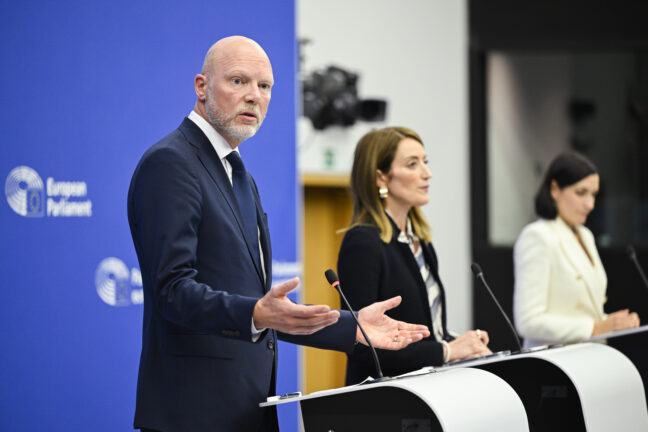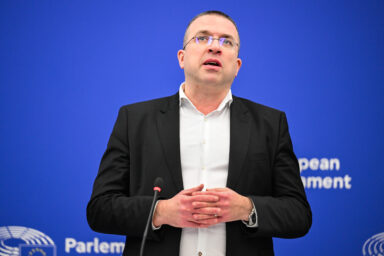The red tape suffocating Europe‘s businesses is not going anywhere any time soon. The European Parliament has rejected it own agreement to cut sustainability reporting and due diligence rules. EPP blames dissident Socialist MEPs for the failure, leaving the door open to working with far-right groupings.
Lawmakers in the European Parliament rejected a compromise agreement on forming its negotiating position on the EU Commission’s Omnibus I on Wednesday, 22 October. The legislation was to have introduced significant reductions in the EU’s sustainability reporting and due diligence regulations.
A narrow loss
The agreed position suffered a narrow defeat as 309 MEPs voted in favour, 318 against, and 34 members abstained. The result means the Omnibus package is to return to parliamentary negotiation stage. The vote was conducted using secret ballots, making it unclear which lawmakers supported or rejected the deal, rapporteur Jörgen Warborn (EPP/SWE) said at the following press conference.
The rapporteur expressed his frustration. The proposed legislation aimed to alleviate regulatory burdens for businesses, yet the very coalition that negotiated in good faith fractured at a critical moment. Mr Warborn denounced the 31 Socialist MEPs who challenged the deal, asserting their actions were detrimental to European competitiveness.
“The intention was to create a business-friendly environment,” Mr Warborn stated emphatically. He had collaborated with both S&D and the Renew parties, hoping to consolidate a compromise that struck a balance between sustainability and economic growth. “I worked hard with the platform parties to find good compromise solutions,” he added, highlighting the efforts made to forge a consensus. The EPP’s commitment was evident, as Mr Warborn articulated the desire to see this agreement come to fruition. He lamented, “It’s disappointing that we couldn’t move forward.”
You might be interested
A fragile compromise
The Omnibus package, unveiled by the European Commission as part of its plan for regulatory simplification, sought to revamp various regulations, including the Corporate Sustainability Reporting Directive (CSRD) and the Corporate Sustainability Due Diligence Directive (CSDDD). Among its most contentious proposals was a dramatic reduction in the number of companies covered by the CSRD, limiting its scope to those with more than 1,000 employees. The revisions aimed to increase compliance efficiency and bolster European businesses, yet the path to agreement was fraught with partisan divisions.
It’s up to the S&D to clarify how they see this outcome and how they see their relationship with the platform parties. — MEP Jörgen Warborn (EPP/SWE)
A tentative compromise emerged after arduous negotiations, with the EPP and left-leaning factions aligning to create a package that would still provide necessary business clarity. However, this fragile alliance proved insufficient. The EPP’s threat to join forces with far-right parties loomed large during discussions, revealing a tenuous balance of power within the Parliament.
In the wake of the vote, Mr Warborn was clear about where he placed the responsibility for the failure. “It was challenged by 31 S&D colleagues,” he remarked, implying their defection severely impacted the outcome. This breakdown in unity prompted him to call on S&D to reassess their commitment to the coalition: “It’s up to the S&D to clarify how they see this outcome and how they see their relationship with the platform parties.” By ‘platform parties‘, Mr Warborn meant the dwindling political centre.
Costly defections
Discontent simmered just beneath the surface, as Mr Warborn considered the implications of a failed partnership with the leftist bloc. He maintained that the EPP remained devoted to fostering a competitive Europe, asserting, “We will stay committed to create a competitive Europe that delivers both on sustainability and competitiveness.” However, it was evident that he was also weighing alternative alliances.
We need to give clarity for businesses at the end of the day. — Jörgen Warborn
When questioned about the possibility of cooperating with far-right parties to salvage the legislation, Mr Warborn deftly sidestepped the issue. “I don’t want to speculate on their potential answers; it’s too early to do that,” he affirmed, striving to maintain a diplomatic tone. Instead, he focused on the urgency of the situation, expressing his desire for clarity: “We need to give clarity for businesses because at the end of the day, this is about businesses creating good-paying jobs in Europe.”
As the implications of this setback continued to unfold, it became apparent that the divisions within the Parliament would complicate future legislative efforts. The urgent need for businesses to navigate a clearer regulatory landscape remained unaddressed, with the next parliamentary vote on the Omnibus package now pushed to November 13. Mr Warborn’s hope for a swift resolution echoed in his closing remarks as he reiterated the importance of collaboration, voicing a plea for unity among the platform parties.
Palpable frustration
Mr Warborn’s palpable frustration was directed firmly at those he felt had undermined a collective effort for compromise. The failure of the Omnibus package not only stalled legislation but also jeopardised the political equilibrium necessary for effective governance in Europe.
While the Swedish Christian democrat publicly dismissed speculation about aligning with far-right groups, his remarks hinted at a growing restlessness within the EPP as it contemplates its next moves. As the political stakes rise, the pressure mounts on all parties involved to reassess their positions and foster the cooperation that European businesses now desperately need.











